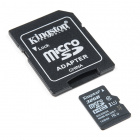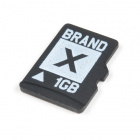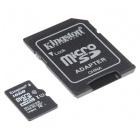SparkFun gator:log Hookup Guide
Other Troubleshooting Tips
Below are common issues to check, if you are having problems with your gator:log.
Check the Status LED Behavior
The behavior of the status LEDs may indicate different issues:
ST1LED:- 3 Blinks: The microSD card failed to initialize. You may need to format the card with FAT16/FAT32 on a computer.
- No Blinking: The gator:log probably isn't receiving data across the RX pad. Double check your connections.
ST2LED:- No Blinking: The gator:log probably isn't writing data to the SD card. Double check your SD card formatted properly, that the
config.txtfile is created on initialization, or your SD card isn't full.
- No Blinking: The gator:log probably isn't writing data to the SD card. Double check your SD card formatted properly, that the
Original gator:bit board
Double check which gator:bit board you are using. As mentioned earlier, the gator:log will not operate with the original gator:bit. Users must use the updated gator:bit (v2) board.
Add Delays Between Character Writes
By adding a small delay between data logging operations, you can give gator:log a chance to record its current buffer.
The gator:log may not save all the data properly, if there are a lot of characters being sent right next to each other. Inserting a small delay of 15ms between large character writes will help open:log record data without dropping characters.
Config File
The config.txt file is used to store the configuration settings for the ATmega328P to operate as a data logger. This file should not be modified. Changing the stored setting may potentially configure the gator:log in a way that locks users out. In which case, the gator:log may become unrecoverable without a special programmer. Users who have accidentally modified the file, can restore it with the following settings:
9600,26,3,0,1,1,0
baud,escape,esc#,mode,verb,echo,ignoreRX
Likewise, users who have bricked the gator:log may be able to insert a freshly formatted µSD card with a config.txt file containing the two lines as shown above.
Empty Files
The gator:log will not create a blank file without data. The file isn't actually created until data is put in it.
Double Check File Names
All file names should be alpha-numeric, according to the 8.3 filename guidelines. MyLOG1.txt is ok, but Hi !e _.txt will not work.
Format your µSD Card
Make sure that you format your card using a FAT16 or FAT32 format. (If you did not format your µSD card on a Windows OS, reformat the µSD card and create a DOS filesystem on the SD card.)
If you are running into issues writing to the SD card at high speeds, try to use a card with few or no files on it. (i.e. An 8GB µSD card with 3.1GB worth of ZIP files or MP3s has a slower response time than an empty card.)
Swap µSD Cards
There are many different types of card manufacturers, relabeled cards, card sizes, and card classes, and they may not all work properly. We have tested the following cards to work with the gator:log. If you run into an issue using one of these SD cards that you purchased from us (after formatting it properly), please create a post on our forum.
Old or Frequently Used Cards
All SD cards have a finite lifespan. A typical flash memory card unit has approximately 10,000 write/erase operations. The continued use of an old or frequently used SD card; may result in corrupted files or data.
Fakes and Counterfeits
Be wary of purchasing fake or counterfeit SD cards from overseas suppliers. The cost benefits may be tempting, but it can be a gamble.
Other Considerations
Below are a few other considerations for SD cards:
- SD cards are somewhat fragile and will usually cease to function once damaged, structurally.
- SD cards a usually waterproof to a certain degree, but should be clean and dry before use (including the hardware).
- SD cards have a wide operating temperature, but may fail in extreme temperatures (though you may run into other hardware issues first).
Verify the Number of Files in the Root Directory
The gator:log will only support up to 65,534 log files in the root directory. We recommend reformatting your µSD card to clear space and improve logging speed.


